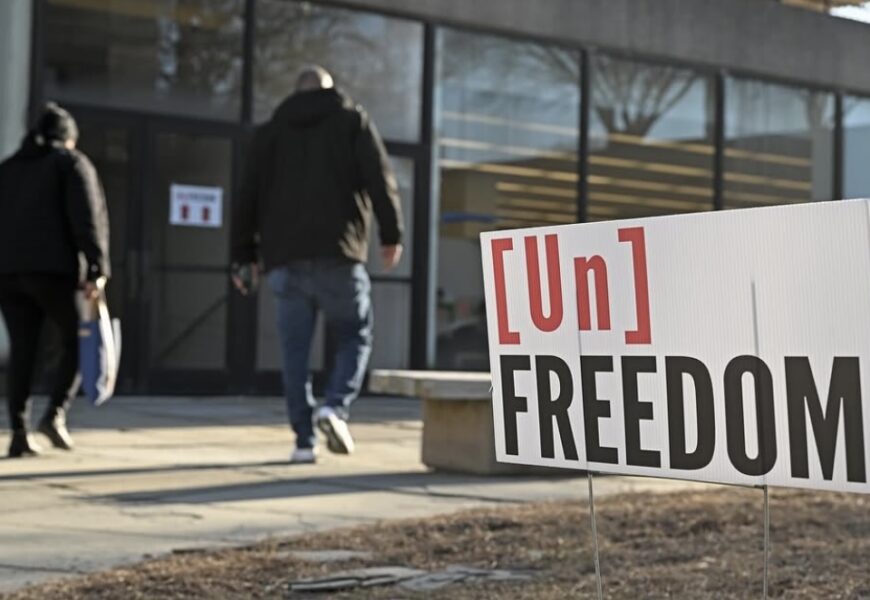Courtesy of Sean Elliot
On Monday, February 24, the second event in the [Un]Freedom Colloquium occurred, jointly organized by Connecticut College and the Center for Housing Equity and Opportunity. The event addressed the ongoing housing crisis in New London and greater Connecticut. Following the screening of the new CT Public documentary Fighting For Home: How Housing Policy Keeps Connecticut Segregated (2024), which “explores the legacy of past exclusionary zoning and redlining policies in the current housing crisis,” audiences were left informed and motivated to act, to help themselves and/or their community who may be housing insecure. The film included interviews with residents of New London and other Connecticut cities about their eviction experiences and struggle to find secure, affordable housing.
Connecticut ranks 4th in the national housing price index and lacks a significant affordable housing stock. The film and discussion highlighted how poverty and housing insecurity are deeply intertwined—without stable housing, individuals and families struggle to escape the cycle of poverty. Following the screening, Fionnuala Darby-Hudgens, Director of Data Strategic Planning with CTData Collaborative, moderated a panel discussion. The panel featured Sabrina Buckwalter, an independent investigative journalist and filmmaker; Shanay Fulton, Secretary of the Middletown, CT Planning & Zoning Commission; and Jacqueline Rabe Thomas, an investigative reporter with Hearst Connecticut Media Group. Together, they explored the historical and present-day realities of housing inequality in Connecticut and the importance of policy reform and community action to lift the state out of the crisis.
The event is part of a broader discussion of “unfreedom,” which describes the condition of legally free people who lack essential human rights because of discrimination. The panelists argued that true freedom requires material rights such as equitable food, education, and housing access. Without these guarantees, marginalized communities remain effectively unfree. The discussion emphasized that the ongoing housing crisis in Connecticut is not merely a matter of economics but a civil rights issue.
Historically, exclusionary zoning has been a tool for maintaining segregation in Connecticut. The state’s 1924 zoning plan laid the groundwork for economic and racial segregation through race-based zoning laws, redlining in the 1930s, and racially restrictive covenants in the 1940s. Even today, increasing minimum lot sizes and other exclusionary zoning tactics disproportionately disadvantage low-income communities. This systemic inequality is further reinforced by landlords who exploit the market by raising rents arbitrarily and evicting tenants without cause. Renters are often treated as paychecks, not people, reducing housing to a commodity rather than a fundamental human need.
Panelists called for more representation of underrepresented individuals in decision-making spaces. To understand local housing issues, tenets must organize to connect in different realms of their communities. “We want a voice, we want transparency. We want to be recognized as a union and respected as human beings,” an interviewee in the film said. The Connecticut Tenants Union represents renters exploited by their landlords. “We must build a Connecticut for the multiracial working class—a Connecticut which guarantees a home for all. We must build a Connecticut committed to the well-being of all its citizens. We are motivated by the need to build a better world, for ourselves and all generations to come,” the CT Tenants Union webpage states. These unions are crucial in fostering a collective voice and improving the living conditions for citizens statewide.
The following week, the series continued with an event on Monday, March 3rd, [Un]Freedom in Tribal Nations: The Politics of Food and Housing Security. It featured a panel discussion with members of the Eastern Pequot Tribal Nation, Conn Sociology Professor Ron Flores, and Conn Anthropology Professor Rachel Black. History Professor Leo Garofalo moderated the panel and Q&A. After the event, I spoke with Professor Garofalo, who teaches Latin American history. He told me about his interest in Indigenous populations in southeastern Connecticut, specifically Nameaug, an Indigenous name for New London, and the connections between the history of Indigenous peoples in southern New England and those of Latin America.
“Today’s event was about housing and food…[which] are the core of everything that we do and everything that we’re able to do. If you don’t have housing, if you don’t have food, if you don’t have homeland and access to homeland [and] if you don’t have ways of creating your own food systems and maintaining them and sustaining them, you have no future,” the Professor said.
The [Un]Freedom Colloquium series will conclude on Saturday, March 29th, 2025, from 1:00 p.m. to 6:00 p.m. in Evans Hall, Cummings Art Center. The Local Histories of [Un]Freedom: Student and Community Historian Conference will feature student and local historians presenting research in progress and focusing on the craft of shaping historical narrative. “I’m very committed to bringing … the tools of history together, understanding the past, and using its lessons in the present day to create a better future,” Professor Garafalo remarked. Faculty and alumni will discuss published research and insights into their historical practices. All past recordings of the (Un)Freedom series can be found on their website.











